|
|
|
Sort Order |
|
|
|
Items / Page
|
|
|
|
|
|
|
| Srl | Item |
| 1 |
ID:
027124


|
|
|
|
|
| Publication |
London, Hamish Hamilton, 1972.
|
| Description |
xvi, 179p.hbk
|
| Standard Number |
24102143X
|
|
|
|
|
|
|
|
|
|
|
|
Copies: C:1/I:0,R:0,Q:0
Circulation
| Accession# | Call# | Current Location | Status | Policy | Location |
| 011087 | 956.95/JOH 011087 | Main | On Shelf | General | |
|
|
|
|
| 2 |
ID:
184361
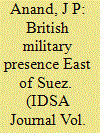

|
|
|
| 3 |
ID:
038648
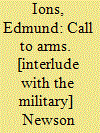

|
|
|
|
|
| Publication |
Newson Abbot, David and Charles, 1972.
|
| Description |
249p.Hbk
|
| Standard Number |
0715356208
|
|
|
|
|
|
|
|
|
|
|
|
Copies: C:1/I:0,R:0,Q:0
Circulation
| Accession# | Call# | Current Location | Status | Policy | Location |
| 011146 | 923.541/ION 011146 | Main | On Shelf | General | |
|
|
|
|
| 4 |
ID:
047015


|
|
|
|
|
| Publication |
London, I.B. Tauris Publishers, 1996.
|
| Description |
xii, 268p.hbk
|
| Series |
Tauris Academic Studies
|
| Standard Number |
1850439559
|
|
|
|
|
|
|
|
|
|
|
|
Copies: C:1/I:0,R:0,Q:0
Circulation
| Accession# | Call# | Current Location | Status | Policy | Location |
| 044566 | 956/SHA 044566 | Main | On Shelf | General | |
|
|
|
|
| 5 |
ID:
155115
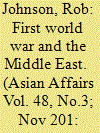

|
|
|
|
|
| Summary/Abstract |
The First World War in the Middle East swept away five hundred years of Ottoman dominion. It ushered in new ideologies and radicalized old ones – from Arab nationalism and revolutionary socialism to impassioned forms of atavistic Islamism. It created heroic icons, like the enigmatic Lawrence or the modernizing Atatürk, and it completely re-drew the map of the region, forging a host of new nation states, For many, the self-serving intervention of these powers in the region between 1914 and 1919 is the major reason for the conflicts that have raged there on and off ever since. Yet many of the most common assertions about the First World War in the Middle East and its aftermath are devoid of context. This article argues that, far from being a mere sideshow to the war in Europe, the Middle Eastern conflict was in fact the centre of gravity in a war for imperial interests. Moreover, contrary to another persistent myth of the First World War in the Middle East, local leaders and their forces were not simply the puppets of the Great Powers. The way in which these local forces embraced, resisted, succumbed to, disrupted, or on occasion overturned the plans of the imperialist powers for their own interests in fact played an important role in shaping the immediate aftermath of the conflict – and in laying the foundations for the troubled Middle East.
|
|
|
|
|
|
|
|
|
|
|
|
|
|
|
|
| 6 |
ID:
024956


|
|
|
|
|
| Publication |
DelhI, Oxford University Press, 1979.
|
| Description |
346p.: ill.Hbk
|
| Contents |
Vol. II: 1947-1956
|
|
|
|
|
|
|
|
|
|
|
|
Copies: C:1/I:0,R:0,Q:0
Circulation
| Accession# | Call# | Current Location | Status | Policy | Location |
| 018462 | 923.254/GOP 018462 | Main | On Shelf | General | |
|
|
|
|
| 7 |
ID:
146039
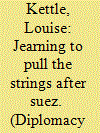

|
|
|
|
|
| Summary/Abstract |
This analysis re-instates the importance of the 1958 British intervention in Jordan within the study of Anglo–American relations and the revisionist literature on Suez. It does so by challenging the idea of British subservience to American foreign policy after the 1956 crisis, and it reveals two key lessons learnt by London: that Britain’s economy, power, and influence were in decline and that Britain could no longer intervene in the Middle East without American support. Having learnt these lessons, Prime Minister Harold Macmillan proved to be a shrewd political actor who used the opportunity of the Jordan intervention to turn the policy of the Dwight Eisenhower Administration to British ends, regaining Britain’s maximum power and prestige for the minimum loss of resources.
|
|
|
|
|
|
|
|
|
|
|
|
|
|
|
|
| 8 |
ID:
023773


|
|
|
|
|
| Publication |
London, Hutchinson, 1989.
|
| Description |
vii, 581p.: ill.Hbk
|
| Standard Number |
0091739853
|
|
|
|
|
|
|
|
|
|
|
|
Copies: C:1/I:0,R:0,Q:0
Circulation
| Accession# | Call# | Current Location | Status | Policy | Location |
| 031132 | 923.542/CAR 031132 | Main | On Shelf | General | |
|
|
|
|
| 9 |
ID:
146498
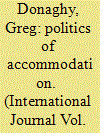

|
|
|
|
|
| Summary/Abstract |
This paper re-examines Canada’s response to the Suez Crisis within the context of its overall approach to the Middle East in the early 1950s. It reminds contemporary readers that most Canadian policymakers, including Prime Minister Louis St. Laurent and his Secretary of State for External Affairs, Lester B. Pearson, viewed the distant and unfamiliar region with reserve, as one better left to the Great Powers to sort out. That view only changed in 1956, when the Suez Crisis, Anglo-American discord, and the possibility of nuclear war threatened Canadian strategic interests, transforming Canada into a small regional stakeholder.
|
|
|
|
|
|
|
|
|
|
|
|
|
|
|
|
| 10 |
ID:
120422
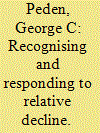

|
|
|
|
|
| Publication |
2013.
|
| Summary/Abstract |
It became increasingly apparent in the 1950s that Britain was in long-term relative economic decline. However, during far-reaching reviews in 1959-1963 of future policy, the Foreign Office and the Treasury could not agree that timely strategic retrenchment would be an appropriate response. Ministers believed that Britain would remain a world Power; the British economy continued to be handicapped by higher levels of defence expenditure than those of other western European Powers; and it took an economic crisis to force a decision to withdraw from east of Suez.
|
|
|
|
|
|
|
|
|
|
|
|
|
|
|
|
| 11 |
ID:
126285
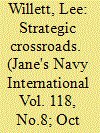

|
|
|
| 12 |
ID:
040500
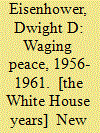

|
|
|
|
|
| Publication |
New York, Doubleday and company, Inc., 1965.
|
| Description |
xxiii, 741p.Hbk
|
|
|
|
|
|
|
|
|
|
|
|
Copies: C:1/I:0,R:0,Q:0
Circulation
| Accession# | Call# | Current Location | Status | Policy | Location |
| 002007 | 923.173/EIS 002007 | Main | On Shelf | General | |
|
|
|
|
| 13 |
ID:
092072
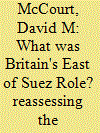

|
|
|
|
|
| Publication |
2009.
|
| Summary/Abstract |
Although often considered an objective fact, Britain's "East of Suez role" was actually a rhetorical construction. As such, it was dependent on the continued ability of Britain to "make" that role and other important players to "cast" Britain into it. But the Wilson government's initial support for East of Suez had the paradoxical effect of bringing its coherence into question. Without a British future in Aden, East of Suez was increasingly linked solely to the Far East, where, with the end of Confrontation in 1966, the argument for staying lost much of its force. Other interested Powers were also increasingly unable to cast Britain into the role: the nationalist tide and the United States' tribulations in Vietnam being primary factors. The article thus shows that thinking through the implications of this realisation provides a better understanding of the withdrawal than by resting on economic or domestic political factors alone.
|
|
|
|
|
|
|
|
|
|
|
|
|
|
|
|
|
|
|
|
|